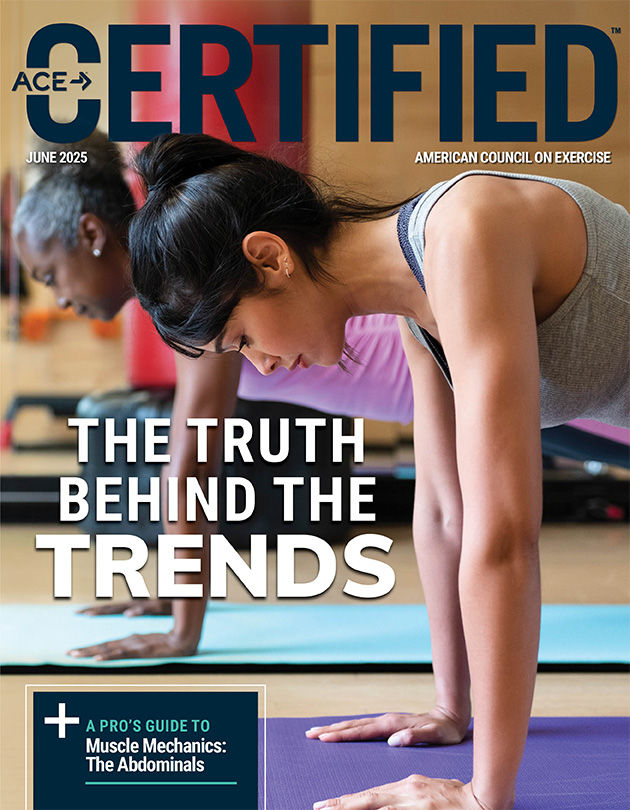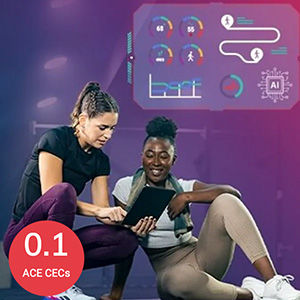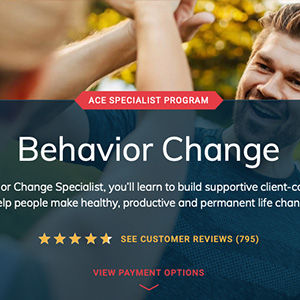
In today’s evolving health and wellness landscape, coaching is no longer an emerging trend—it’s a powerful, evidence-informed approach that is helping millions of people create lasting change. Today, health coaching continues to gain traction not only as a career path but also as an essential complement to traditional fitness, healthcare and wellness services. This growth is driven by a broader recognition of the role behavior change plays in improving long-term health outcomes, and by an increasing demand for professionals who can guide clients through lifestyle transformations with empathy, skill and structure.
Whether you’re a personal trainer, group fitness instructor or health professional, integrating coaching strategies into your work can expand your reach and deepen your impact. But what does it actually take to be a successful health coach today? This article explores foundational best practices—from education and credentialing to client-centered coaching skills—and offers insights from experienced professionals who are thriving in the field. Whether you're just getting started or refining your existing coaching practice, you’ll find guidance here to elevate your effectiveness and support your clients in meaningful, sustainable ways.
Education and Credentialing
Health coaching is a rapidly expanding field with opportunities across diverse settings—corporate wellness, clinical care, private practice and entrepreneurial ventures. Because of this diversity, educational requirements can vary. However, a certification from an organizaton accreddited by the National Commission for Certifying Agencies (NCCA) remains the industry baseline and a trusted starting point for most roles.
The National Board for Health and Wellness Coaches (NBHWC), established in 2012, created the first board-certification pathway in partnership with the National Board of Medical Examiners. The NBC-HWC credential is now considered the gold standard and is widely recognized in healthcare, fitness and integrative wellness settings for its emphasis on evidence-based coaching practice.
Today’s educational standards for health coaches go far beyond nutrition and fitness knowledge. A strong foundation in behavior-change theory, motivational interviewing, positive psychology, ethics and trauma-informed care is essential for helping clients achieve sustainable results. Ongoing professional development in areas like chronic disease management, coaching communication and mental well-being is now expected as part of a coach’s long-term growth.
Chris Sandel, founder and owner of Seven Health, based in Surrey, UK, echoes this sentiment: “I originally studied nutrition, but I’ve since invested in ongoing education across coaching, psychology and behavior science. The real value comes from continuously evolving your understanding of how people change.”
One of the most persistent misconceptions about health coaching is that technical knowledge alone—like prescribing exercise or discussing diet—is enough. In reality, the ability to build rapport, foster autonomy and guide meaningful conversations around change is what defines a competent coach. The path to success lies in a commitment to lifelong learning and adapting your education to the populations you serve.
Pro Tip: Client Expectations and Emotional Intelligence
A major focus in current health coaching is managing expectations—especially in emotionally complex scenarios like weight loss. Coaches must be adept at recognizing when a client’s goals are tied to external validation (e.g., career success or relationship improvement) rather than internal health metrics. Helping clients reframe success around measurable, meaningful outcomes like reduced pain, increased energy and growing confidence is now standard practice.
The Art and Science of Coaching
Coaching is both a concrete skill and an abstract aptitude. It requires a well-honed toolkit of evidence-based practices and the knowledge of when to employ those tools. A handful of foundational skills make up the backbone of a good health coaching practice.
“The coach approach is essential for empowering the people you work with,” says Jessica Matthews, DBH, associate professor, program director in the College of Health Sciences and creator of the Masters of Kinesiology in Integrative Wellness program at Point Loma Nazarene University. She highlights the actual “being” skills of coaching—a complete presence with, and focus on, the client—as the foundation of this coach approach. While this may sound simple, it’s not easy. “The best way for coaches to improve is to practice in multiple contexts,” explains Matthews.
Modern coaching relies on a foundational shift: from expert-driven recommendations to client-centered partnerships. Successful coaches focus on what is known as the “coach approach”—a way of being fully present, listening deeply and co-creating plans based on what the client values most. Key methods like the ACE Mover Method™, motivational interviewing and the OARS framework (Open-ended questions, Affirmations, Reflective listening, Summarizing) are at the heart of effective practice today. These tools help uncover clients’ intrinsic motivations and enable them to maintain autonomy, which is essential for sustainable behavior change.
“I don’t give advice, and I never tell clients what to do,” says Abbi Lichtenstein, MA, NBC-HWC. Rather, she prefers a coaching methodology that involves highlighting clients’ positive attributes and capabilities, while letting them dictate the coaching direction.
“People don’t want to be told what to do, even if they’re paying you to help them,” says Sandel. “There are huge benefits to people coming up with their own ideas and implementing them,” he says. This is often challenging for health coaches who, out of an altruistic desire to help, want to feed their clients answers and solutions. However, behavior-change research suggests that individuals are more likely to implement and stick with new behaviors when they feel autonomous, competent and connected. By allowing your clients to determine their own goals, priorities and action steps, you foster autonomy. “It doesn’t matter if I’m right if it doesn’t help them change,” says Sandel. “It is far more important to be effective than to be right.”
Creating a client-centered health coaching practice can be challenging. Following are a few specific tools you can immediately start using with your clients.
Pro Tip: Leverage Digital Tools and Virtual Coaching
The digital transformation accelerated by the pandemic continues to shape health coaching in 2025. Coaches now routinely use platforms like Zoom, WhatsApp or HIPAA-compliant apps for remote sessions. Digital tools for scheduling, journaling, client feedback and outcome tracking have become integral to maintaining engagement, especially with clients who travel or prefer online communication.
SEO-optimized content creation, email marketing and strategic use of social media are also critical for entrepreneurial coaches seeking visibility and scalability in today’s market.
Coaching Toolkit
Powerful Questions
If you want good answers, ask good questions. Powerful and thought-provoking questions can act as a rudder to guide your clients through the tumultuous waters of change. This often involves open-ended questions that cannot be answered with a simple “yes” or “no.” Lichtenstein shares that her use of open-ended questions allows her clients to generate new realizations and perspectives. Open-ended questions invite clients to expand on their thoughts, feelings and beliefs around a particular subject. Powerful questions take open-ended questions a step further in initiating change. These kinds of questions cut to the root of an issue and address things like deep motivations, desired outcomes, deep-seated fears, self-limiting beliefs or possible courses of action. By using powerful questions, you link behavioral changes with intrinsic motivations, fueling the entire change process.
Put it into practice: Get in the habit of asking challenging, thought-provoking questions. Curate a list of powerful questions and then try these questions out with friends, family members or colleagues.
Presence
“To be fully present is to actually, genuinely be with people,” says Matthews, on the power of being present in a coaching session. Being present is a dynamic process that involves a number of other micro skills, such as setting an ideal environment, attuned listening and reflecting. It involves putting the person you are working with at the center of your attention and allowing the session to organically unfold.
“It’s so important that you really listen to your client and then reflect back what you heard so they know you get them,” urges Lichtenstein. Naturally, whether you see clients in person or in a virtual environment, this requires a setting that is conducive to listening; eliminating environmental noise, however, is not sufficient. Often, internal mental chatter can distract us more than external stimuli. In the midst of a coaching session, personal thoughts, self-judgment or ideas might pop up. This is normal but can preclude deep listening. When these distractions arise, you might jot down a quick word or note to ask the client later or simply recognize the distraction and return your focus to your client.
Reflections allow you to connect more deeply with your client and reinforce that you’re paying attention. Reflections can include a summary or paraphrasing of what the client said, a bottom-lining of the main points of a story or double-checking a feeling you are picking up on.
Put it into practice: When trying out your powerful questions with friends or family members, practice deep listening and reflecting. Aim to fully listen to what your counterpart is saying without worrying about what you will say next or how the conversation is going. Affirm that you are listening by reflecting back the person’s sentiments after they finish.
Surrender
As helping professionals, we often envision a specific, desirable outcome for our clients. However, putting too much emphasis on end results hinders the coaching process. While a client may come to you with an intended outcome in mind, such as weight loss or a change in blood biomarkers, the process that brings them there is equally valuable. The coaching relationship is fruitful, not just in its visible yield, but in the learning, experience, awareness and insights that clients develop along the way. Much of the time, these developments are results of what might seem like failed attempts at change.
“It’s not trial and error, it’s trial and learn,” says Taylor Colvey, MA, a health coach in Solana Beach, Calif. “All data that we collect supports change.” The notion of failure as a learning experience is often intuitively simple but challenging for clients to accept. Regularly reaffirming their actions, insights and experiences, regardless of whether or not they adhere to a specified plan, helps clients shift their perspective. Surrendering to the outcome does not, however, disregard a client’s goals and aspirations. “As a coach, I always keep their vision at the forefront of my mind as I assess readiness for change and monitor realistic actions with accountability and support,” Colvey says.
Put it into practice: When learning to surrender to the outcome, turn first to your own life. In what areas have you “failed” or struggled repeatedly over time? Take a closer look—can you identify any insights about your motivations, wants, needs or fears layered into these experiences? Once you find these insights, how can you use them to develop new plans moving forward?
Pro Tip: Business Development and Career Sustainability
Being a thriving coach today requires as much attention to business development as to coaching skills. Partnerships with health clubs, therapy offices or corporate wellness teams can create opportunities for visibility and referrals. Business coaches, professional networks and specialized tools like the ACE ProConnect 2.0 App and ACE Pro Compass can provide guidance on messaging, marketing and time management.
Common Coaching Challenges
Beyond building excellent coaching skills, one of the biggest challenges health coaches face, especially those who operate their own businesses or work as independent contractors, is finding clients. Consumers are often unsure of what a health coach does or how they will benefit from their services.
“My best advice for obtaining clients is to create a ton of content. Show people you know what you’re talking about by demonstrating that you know what you’re talking about,” urges Sandel. This process takes time. He recommends creating at least one touch point a week, whether that is a podcast, article, webinar or other form of content. Further, he suggests that coaches find the platform where they have their best voice. For him, podcasting has been the best medium and is how he has gained most of his clients.
Another method of gaining clients is offering free introductory sessions. Lichtenstein and Colvey both offer these sessions to help clients better understand what health coaching is. Colvey offers a free 30-minute session and uses this time to ask clients about their inspirations and what things are getting in the way. Matthews notes that the ambiguity around coaching is often a barrier when looking to obtain clients or jobs. “We must create clarity around who a qualified health coach is and what a health coach really does,” she says.
Beyond the difficulty of acquiring clients, many entrepreneurial coaches struggle with operating their business. As helping professionals, business acumen may not come naturally. Colvey mentions that she reads a great deal of free content from entrepreneurship coaches to help with her business, while Lichtenstein has found partnerships with other organizations, such as health clubs and therapy offices, to be particularly helpful places to house her business.
You might also opt to work with a business coach, which Sandel says has been transformative for his business. “I’ve been working with a business coach for the last year, and that has been huge. It’s really helped me be able to work out where I should be spending my time, how I talk about what I do, the kind of clients I serve,” he says. “Working with a coach has had a significant impact.”
As awareness around health coaching continues to expand, it is vital that coaches are equipped with the skills to effectively guide clients toward lasting change as well as the marketing, business and operational skills to further their own careers.
Continual Evolution
This is an exciting time for the field of health coaching. As the public becomes increasingly aware of what health coaches do and what they have to offer, the opportunities for well-trained and highly skilled coaches will continue to rise. To bring about the best client results and, ultimately, further the field, our coaching skills must grow and advance with the industry.
“The more you study, the more you realize how little you know,” says Sandel. While humbling, this revelation can spur continued education, training and growth in your coaching practice.
As health coaching continues to evolve and expand, new questions, insights and best practices will arise. To stay up-to-date with industry trends, ask your own questions or offer valuable insights, check out the ACE ProConnect App. As each of us shares our knowledge and experience, we will further the field of health coaching, allowing us to better serve those who come to us for help.
Expand Your Knowledge
AI in Fitness: The Next Frontier for Coaches
For health and fitness professionals, understanding how AI transforms traditional tools into advanced solutions is essential for staying ahead. This course introduces a comprehensive approach to navigating the AI age in fitness. Learn how to distinguish between the Information Age and the AI Age, explore AI's strengths and limitations, and discover best practices for implementing AI tools in program design and client support. You’ll also gain actionable insights into using AI and prompt-engineering to streamline workout programming, movement analysis, and personalized client care—all while avoiding common pitfalls like over-reliance on AI-generated recommendations.
ACE Behavior Change Specialist Program
With the right coaching approach and strategy, positive habits can be built to make a lifelong impact on health and wellbeing. The ACE Behavior Change Specialist Program will teach you the key tools to promoting behavior change and creating a foundation for a healthy lifestyle. You will learn how to help clients of all backgrounds recognize counterproductive behaviors and coach them to discover new methods to move more, eat better and make healthier decisions for themselves and their families.





 by
by 




